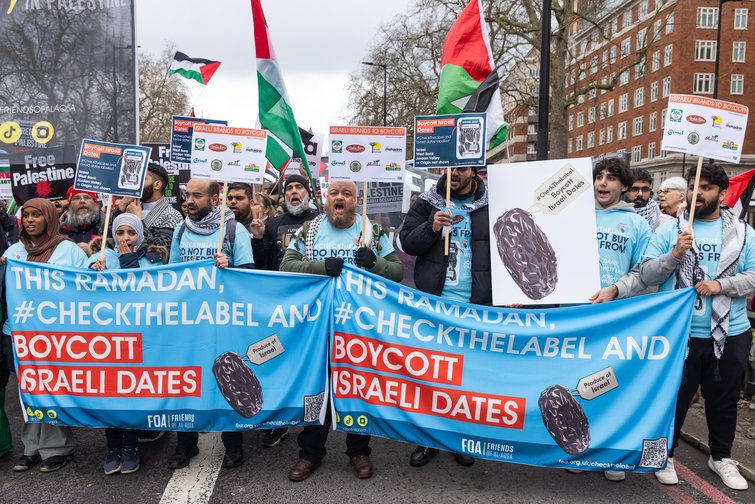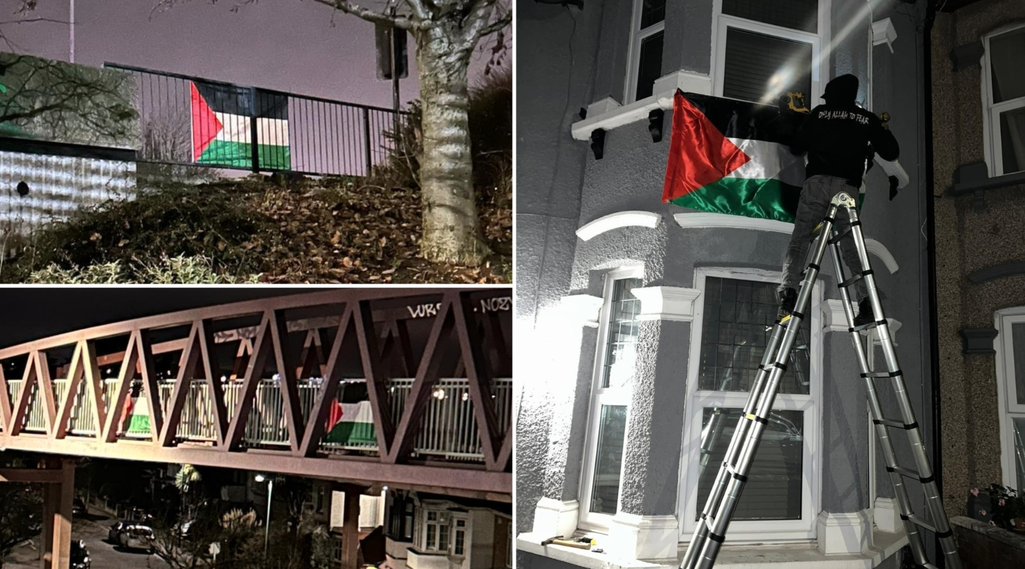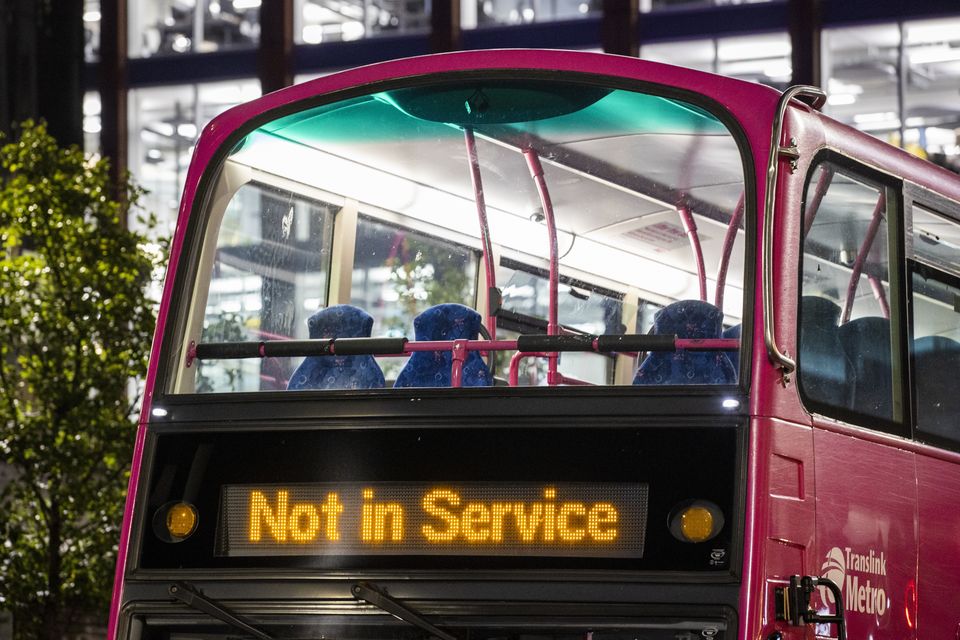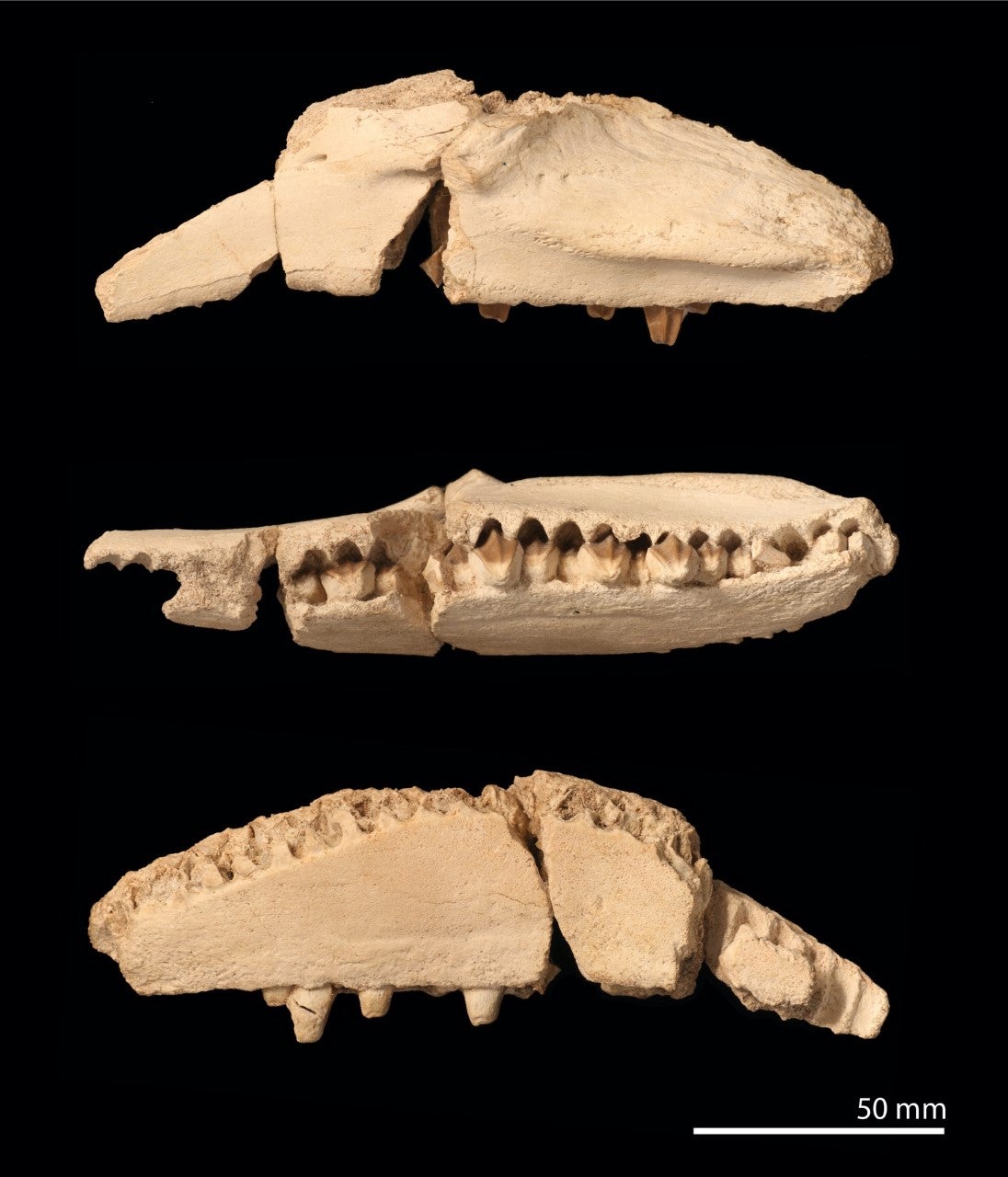The Tories want to stop public bodies engaging in ‘BDS’ campaigns – but that’s unlikely to stop grassroots organisers
Nandini Naira Archer
21 February 2024

Pro-Palestine activists with banners calling for a boycott of Israeli dates in London 17 February 2024
Mark Kerrison/In Pictures via Getty Images
When neighbours who had met at pro-Palestine marches learnt that a charity in their east London borough was raising cash for the Israeli military, they organised quickly.
Their goal was to pressure the local Chabad Lubavitch Centre to withdraw its fundraiser for a reserve unit in northern Israel. Horrific details about Israel’s siege of Gaza had by then been emerging for months, with reports of tens of thousands of deaths and scenes of devastation in civilian areas.
“We’re young, old, men, women, Muslim, non-Muslim,” one told us. “We protested outside their offices and wrote to the Charity Commission and our MP en masse. We also climbed ladders to wave our flags in protest… We were disgusted that the genocide had made its way to our doorstep.”
The neighbours’ group was hastily convened in December under the name of the Redbridge Palestine Solidarity Network; today, a spokesperson says the network has more than 350 members. Redbridge is a large, multicultural borough near Greater London’s boundary with Essex that has both Muslim and Jewish populations.
The charity, in the Gants Hill area of Redbridge, never responded to the campaign, and the donation link remains live on its website – though the wording has subtly changed from “donation of equipment needed by soldiers of Israel” to “donation in honour of our soldiers and the safe return of the hostages”. (The Chabad Lubavitch Centre did not respond to our requests for comment.) What’s more, Redbridge Council has spent more than £2,000 removing Palestinian flags from main roads after receiving a letter from the lobby group UK Lawyers for Israel.
But the group still considers its actions a success. Members typically replace the flags within 24 hours in a sort of cat-and-mouse game, and continue to picket the charity, part of a larger network across north-east London that supports local Jewish communities. Sooner or later, the Redbridge Palestine Solidarity Network hopes, the Chabad Lubavitch Centre will reconsider its backing for the Israeli military.
“The support for Palestine in our area is clear,” said the group member, who asked not to be named. “We won’t stand by while councils, companies and charities are complicit in genocide and politicians are failing to speak up or represent us as they should.”
Israel was accused of perpetrating genocide in Gaza last month at the International Court of Justice by South Africa, which Israel denies. The court stopped short of calling for a ceasefire, but ordered Israel to “prevent” acts that could amount to genocide. A ruling on whether Israel has actually been committing genocide could take far longer.

Redbridge Palestine Solidarity Network outside their local town hall
The flags, and the picketing of the charity’s offices, represent just one of many small acts of resistance taking place across the UK and the world under the ‘Boycott, Divestment and Sanctions’ (BDS) umbrella. BDS targets specific public bodies and private companies accused of aiding what it calls ‘Israeli apartheid’.
Since it began in 2005, the BDS campaign has attracted high-profile supporters including archbishop Desmond Tutu in South Africa, US politicians like Ilhan Omar, and authors from Arundhati Roy in India to Benjamin Zephaniah in the UK.
But the movement has also attracted significant pushback from Israel’s supporters, particularly in the UK and US. The ramifications of an ‘anti-boycott’ bill currently making its way through Britain’s House of Lords are likely to ripple beyond the UK’s shores, showing how far Israel’s allies are prepared to go in clamping down on the practice.
“Israel can only maintain military occupation and apartheid because of the complicity of governments and corporations in Britain and around the world,” said Lewis Backon, campaigns officer at the Palestine Solidarity Campaign that co-organises the weekly pro-Palestine demonstrations that have been taking place across the UK since October.
“BDS gives us a strategy to turn our rage into meaningful action. It is a way in which people in Britain and elsewhere can retract our tacit approval of Israel.”
The campaign calls for boycotts of a small number of companies where it believes it can have a maximum impact – and it calls on a larger list of companies to divest from the state of Israel. Since October, leaders of the movement from Palestinian civil society have also endorsed what they call “organic boycott targets” which BDS itself did not initiate – McDonald’s, Pizza Hut and Burger King.
“The strategy of BDS has always been about institutional divestment over consumer boycotts,” said Shabbir Lakha, a campaigner with the anti-war group Stop the War. Personal consumer boycotts in the UK are welcome, he added, but “it’s the wider organised movement around the world that’s important – essentially creating a situation where Israel is a pariah state, as are companies that directly profit from apartheid and occupation”.
Anti-boycott bill
The “draconian” new anti-boycott bill – being considered by the UK’s House of Lords this week – is evidence that the threat of BDS is working, according to Lakha.
First introduced to the British Parliament in the summer by the Department for Levelling Up, Housing and Communities, the Economic Activity of Public Bodies (Overseas Matters) Bill was originally promised in the 2019 Conservative Party manifesto in a pledge to “ban public bodies from imposing their own direct or indirect boycotts, disinvestment or sanctions campaigns against foreign countries”.
Israel and Palestine are the only states currently explicitly named in the legislation, whose stated aim is to stop public bodies from “pursuing their own foreign policy agenda”.
Opponents argue that, in reality, the bill itself will stop public bodies – including NHS trusts, councils, and even the government itself – achieving their environmental, ethical and international human rights obligations, by forcing them to invest in companies and states whose actions are damaging.
Amnesty International has previously said the bill “effectively grants Israel impunity at a time of flagrant breaches of international law in Gaza and the West Bank”. “Public procurement represents around 14% of the UK economy,” said Kristyan Benedict, the charity’s crisis response manager, “which provides an enormous opportunity to drive the transition to sustainable production and consumption.
“If, however, businesses believe that public bodies are unlikely to exclude them from contracts on human rights grounds, then this creates a form of moral hazard where companies that respect human rights face being undercut by those that don’t.”
The wording of the bill is “deliberately vague”, which will make it difficult to implement, in the opinion of Daan de Grefte – a legal officer at the European Centre for Legal Support, which gives legal help to Palestinian rights activists across Europe.
But the vague wording could also give rise to a wider “chilling effect”, leading people to believe it bans free expression on Palestine altogether. “It’s quite evident that the main intent of this bill is to silence politicians and others from speaking up about Palestinian rights,” said de Grefte.

Locals put Palestine flags up around Redbridge, east London |
Redbridge Palestine Solidarity Network
A wave of similar moves to ban BDS have taken place in states and university campuses across the US. And in Germany, 2019 legislation condemned any sympathy with BDS in official institutions, calling it antisemitic. A new initiative there similarly attempts to ban boycotts of publicly funded institutions such as arts bodies and academic groups.
According to Amnesty’s Benedict, “smear campaigns” by Israel and its allies are behind this proliferation of “anti-BDS” laws. “Such laws violate freedom of expression, help shield the Israeli authorities from accountability for violations of international law, and harm the fight against genuine antisemitism,” she added.
But not all western countries have reacted with hostility. Across the Irish Sea, Sinn Féin president Mary Lou McDonald has announced that her party is working with councils across Northern Ireland to “ban the awarding of contracts to businesses that profit from human rights abuses in Palestine and across the world”.
Victories
It is tough to measure the effect of BDS on company ledgers or Israel’s economy: the movement is largely decentralised, with activities happening locally and nationally run by different groups and individuals.
But companies are cutting ties with Israel – most recently the German sportswear brand Puma, a BDS target since 2018, which announced in December that it would not renew its contract with the Israel Football Association (IFA).
Related story

UK accused of being ‘complicit’ in Gaza deaths after giving Elbit new contract
14 February 2024 | Nandini Naira Archer , Ethan Shone
Revealed: Fresh wave of public cash handed to Israeli arms maker whose weapons are used for ‘genocide’
Puma has rejected claims that the BDS campaign was behind its decision. But the BDS movement has claimed it as a victory, saying: “Leaked internal messages revealed that Puma was under tremendous pressure to drop the contract… The years of relentless, global BDS pressure on Puma and the damage to its image should be a lesson to all companies supporting Israeli apartheid, that complicity has consequences.”
By contrast, McDonald’s and Starbucks have openly admitted that anti-Israel boycotts hurt their sales in the last quarter of 2023. Both claim they have been misrepresented, with McDonald’s distancing itself on a corporate level from the actions of its franchisees seen on social media offering free meals to the IDF. The fast food giant is now seeking $1.3m in damages from the BDS movement alleging defamation.
A current target for the movement in the UK is Barclays Bank. Stella Swain, youth and student campaigner at the Palestine Solidarity Campaign, said Barclays held over £1bn of shares in firms whose “weapons, components, and military technology” were being used by Israel in its attacks on Palestinians, and had provided those firms with more than £3bn in loans.
“You and I aren’t in the market of buying weapons,” she said, “so what we aim to do is target places like Barclays that have shares in these kinds of companies, because that’s what makes them complicit.”
She claims 1,500 people have agreed to close their accounts, and that another larger group of people who currently bank elsewhere have vowed to keep steering clear of Barclays. Swain points out that the bank was also a major target of the South African anti-apartheid movement in the 1980s. (Backers of BDS often draw this comparison; Labour peer Peter Hain told the House of Lords on Tuesday that an anti-BDS bill would have prevented UK councils from boycotting apartheid South Africa at the time.)
“There isn’t any one target that would win this – it has to be more of a gradual approach,” said de Grefte. However, he points to online tourism operators like Trip Advisor, Expedia and Booking.com that continue to profit from Israeli settlers in the occupied territories who rent out their accommodation. “Getting them to change their position on this would be a huge blow to Israel’s ability to say this is business as usual,” he said.
Back in Gants Hill, the campaigners take over a branch of McDonald’s every Thursday to “peacefully chant, sit in and educate customers and staff on why McDonalds is complicit in genocide”.
And as Ramadan approaches, they stand outside the town hall and tell passers-by about which brands of dates – a Palestinian staple – are grown in Israeli settlements, in the hope that people will choose to boycott these, too.
“We basically try every angle,” they say. “We will be relentless. We won’t stop until our voices are heard.”







